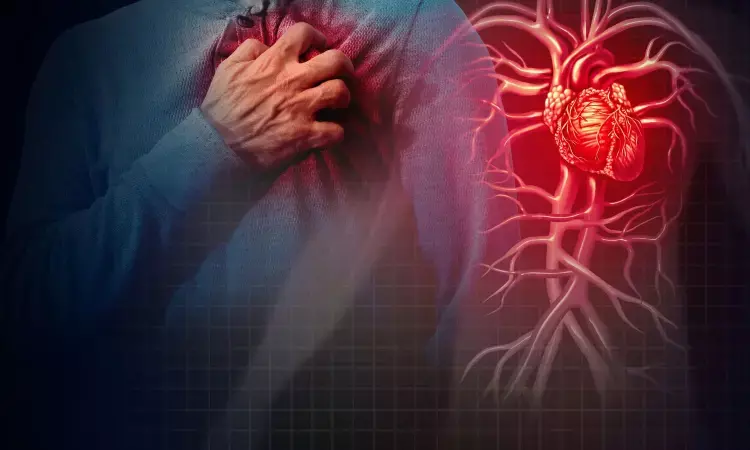- Home
- Medical news & Guidelines
- Anesthesiology
- Cardiology and CTVS
- Critical Care
- Dentistry
- Dermatology
- Diabetes and Endocrinology
- ENT
- Gastroenterology
- Medicine
- Nephrology
- Neurology
- Obstretics-Gynaecology
- Oncology
- Ophthalmology
- Orthopaedics
- Pediatrics-Neonatology
- Psychiatry
- Pulmonology
- Radiology
- Surgery
- Urology
- Laboratory Medicine
- Diet
- Nursing
- Paramedical
- Physiotherapy
- Health news
- Fact Check
- Bone Health Fact Check
- Brain Health Fact Check
- Cancer Related Fact Check
- Child Care Fact Check
- Dental and oral health fact check
- Diabetes and metabolic health fact check
- Diet and Nutrition Fact Check
- Eye and ENT Care Fact Check
- Fitness fact check
- Gut health fact check
- Heart health fact check
- Kidney health fact check
- Medical education fact check
- Men's health fact check
- Respiratory fact check
- Skin and hair care fact check
- Vaccine and Immunization fact check
- Women's health fact check
- AYUSH
- State News
- Andaman and Nicobar Islands
- Andhra Pradesh
- Arunachal Pradesh
- Assam
- Bihar
- Chandigarh
- Chattisgarh
- Dadra and Nagar Haveli
- Daman and Diu
- Delhi
- Goa
- Gujarat
- Haryana
- Himachal Pradesh
- Jammu & Kashmir
- Jharkhand
- Karnataka
- Kerala
- Ladakh
- Lakshadweep
- Madhya Pradesh
- Maharashtra
- Manipur
- Meghalaya
- Mizoram
- Nagaland
- Odisha
- Puducherry
- Punjab
- Rajasthan
- Sikkim
- Tamil Nadu
- Telangana
- Tripura
- Uttar Pradesh
- Uttrakhand
- West Bengal
- Medical Education
- Industry
Thrombectomy Offers Hope for Basilar Artery Occlusion Patients with Mild Deficits

Thrombectomy for basilar artery occlusion (BAO) has proven efficacy in patients with moderate-to-severe deficits, but has unclear benefits for those with mild symptoms.
Thrombectomy for basilar artery occlusion (BAO) may still offer clinical benefit to patients with mild symptoms, according to a large national cohort analysis by Patel et al. and colleagues.
This study entitled “Real-World Outcomes for Basilar Artery Occlusion Thrombectomy With Mild Deficits: The National Inpatient Sample” was published in Stroke.”
Thrombectomy for BAO is efficacious in patients with moderate-to-severe deficits. More data on its benefits for those with mild symptoms must be collected.
This was researched by an observational cohort design. US National Inpatient Sample (2018–2020) was queried for adult patients with BAO and NIHSS <10 for patients treated with thrombectomy versus medical management.
Routine discharge (home or self-care) was the primary outcome measured.
The main findings of the study are:
- There were 17 019 patients with basilar artery occlusion.
- 5795 patients met inclusion criteria, and 880 constituting 15.4%, were treated with endovascular thrombectomy.
- In the propensity score–matched cohort, 880 patients were treated with medical management and endovascular thrombectomy, respectively.
- Endovascular thrombectomy was associated with increased odds of routine discharge and reduced length of hospital stay than medical management.
- In the propensity score matched cohort, endovascular thrombectomy remained associated with greater odds of routine discharge, but there was no reported difference in length of hospital stay.
Concluding further, they said, based on our study findings, “Routine discharge was more common in BAO patients and National Institutes of Health Stroke Scale <10 who underwent thrombectomy in comparison to conventional medical management.”
The findings of this study suggest that thrombectomy may be associated with better functional outcomes despite the lower National Institutes of Health Stroke Scale and should be validated in a clinical trial setting.
Further reading:
https://www.ahajournals.org/doi/abs/10.1161/STROKEAHA.123.043487
BDS, MDS in Periodontics and Implantology
Dr. Aditi Yadav is a BDS, MDS in Periodontics and Implantology. She has a clinical experience of 5 years as a laser dental surgeon. She also has a Diploma in clinical research and pharmacovigilance and is a Certified data scientist. She is currently working as a content developer in e-health services. Dr. Yadav has a keen interest in Medical Journalism and is actively involved in Medical Research writing.
Dr Kamal Kant Kohli-MBBS, DTCD- a chest specialist with more than 30 years of practice and a flair for writing clinical articles, Dr Kamal Kant Kohli joined Medical Dialogues as a Chief Editor of Medical News. Besides writing articles, as an editor, he proofreads and verifies all the medical content published on Medical Dialogues including those coming from journals, studies,medical conferences,guidelines etc. Email: drkohli@medicaldialogues.in. Contact no. 011-43720751


